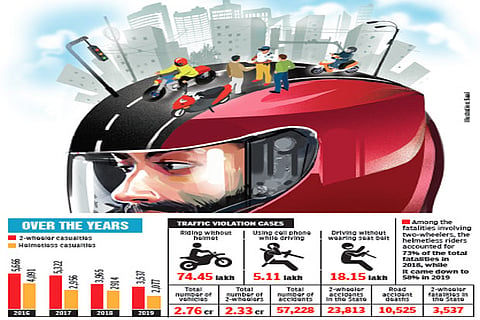

Chennai
Tamil Nadu has witnessed a 28 per cent decline in the number of deaths being reported for riding two-wheelers without helmets in 2019, due to the increased awareness on the safety aspects involved in using proper headgear and strict enforcement of road traffic rules. Repeated court interventions saw traffic police cracking the whip and even youngsters whizzing past without wearing helmets have now become a rarity on State’s busy roads.
In 2019, as many as 3,537 two-wheeler riders and pillion riders were killed in accidents that happened on roads across the State. Of these, 2,077 deaths were due to non-wearing of helmets. In the previous year, 3,965 persons were killed in two-wheeler accidents, of which 2,914 persons were not wearing helmets. Between 2018 and 2019, the number of deaths due to non-wearing of helmet has come down by 28 per cent.
Among the fatalities involving both two-wheeler riders and pillion riders, the helmetless riders accounted for 73 per cent of the total fatalities in 2018 while it came down to 58 per cent in 2019.
According to the Transport department data, the highest number of deaths due to non-wearing of helmets happened in Kancheepuram district with 201 deaths, followed by Tiruvallur (125) and Vellore (122).
Two-wheelers which constitute over 84 per cent of the total vehicular population of the State continues to contribute to the maximum number of accidents and fatalities. Of the 57,228 accidents that happened in the State in 2019, accidents involving two-wheeler topped the list with 23,813 cases. The road accidents in the State recorded 10,525 fatalities last year as against 12,216 in the previous year.
With constant pressure from the Madras High Court, the traffic police had initiated some stringent measures against those violating traffic norms — riding a two-wheeler without a helmet, using a cell phone while driving and driving without wearing a seat belt — by registering over 97 lakh cases last year. Of these, 74.45 lakh cases were registered by the enforcement authorities for riding two-wheelers without helmet. The cases booked for driving without wearing seat belt counted to 18.15 lakh while 5.1 lakh cases were booked for talking over mobile phone while driving.
The Madras High Court had also come down heavily, as recently as in June last year, for not enforcing helmets for pillion-riders. Observing that not a single pillion-rider in the State wears a helmet, the Court pointed out the cases of cities like Delhi and Bengaluru adhering to safety rules for pillion-riders and wondered why the compulsory helmet rule for both the rider and the pillion cannot be strictly implemented in Tamil Nadu too.
According to a United Nation (UN) report, motorcyclists are 26 times more likely to die in a traffic crash than the drivers of passenger cars. Wearing an appropriate helmet improves their chances of survival by 42 per cent and helps avoid 69 per cent of injuries to riders. A motorcycle crash may result in head injuries, through either direct contact with hard objects or as a result of excessive acceleration-deceleration. Most traumatic brain injuries are the result of ‘closed’ head injuries, where there are no open wounds for one to see.
The motorcycle helmet is designed to minimise the risks of all kinds of head injuries. Helmet standards and regulations have been developed to test the effectiveness of helmets in providing protection.
A Transport department official said that the Transport Commissioner has instructed that the supply of helmets to every new two-wheeler buyer by the manufacturer or dealer should be ensured by the RTOs and a report on the same should be submitted to his office every month. According to the Central Motor Vehicle Act, rule 138 (4) (f) 1989, at the time of purchase of a two-wheeler, the manufacturer of the two-wheeler shall supply protective headgear, keeping in mind the specifications prescribed by the Bureau of Indian Standards.
Sumana Narayanan, road safety expert and senior researcher, Civic Action Group said that many people have started wearing helmets in the city and even pillion-riders can be seen wearing helmets these days. The increased use of helmets by two-wheeler riders and pillion riders could be attributed to the hike in the penalties for the traffic violations under the Motor Vehicle Amendment Act and the crackdown on erring vehicles by the traffic police and awareness drives, she said pointing out that the penalty for riding two-wheelers without helmet has gone up ten times -- from Rs 100 to Rs 1,000 -- as per the amended Motor Vehicle Act. “Though the hike in the penalty was not imposed in the State, it has created a fear psychosis among the two-wheeler users, forcing them to use helmets,” she said.
Sumana also urged the State government to enforce the new amendments at the earliest, so that it would reduce traffic violations and make our roads better and safer.
Additional Commissioner of Police (Traffic) for Greater Chennai, A Arun, attributed the reduction in fatalities in two-wheeler accident cases due to strict enforcement of the helmet rule as per the High Court directive. “We implemented the rule vigorously and the number of helmet cases booked in 2019 was 158 per cent more compared to that of the previous year in the city. The court even appreciated the efforts of Greater Chennai Traffic Police and asked the rest of the State to follow its footsteps in enforcing the rules,” he said. Arun further said that even motorists, who were a little hesitant in the initial stages, started cooperating over a period as they realised the motive behind the initiative. “The drive continues and two-wheeler riders without helmets are being booked,” he added.
Visit news.dtnext.in to explore our interactive epaper!
Download the DT Next app for more exciting features!
Click here for iOS
Click here for Android